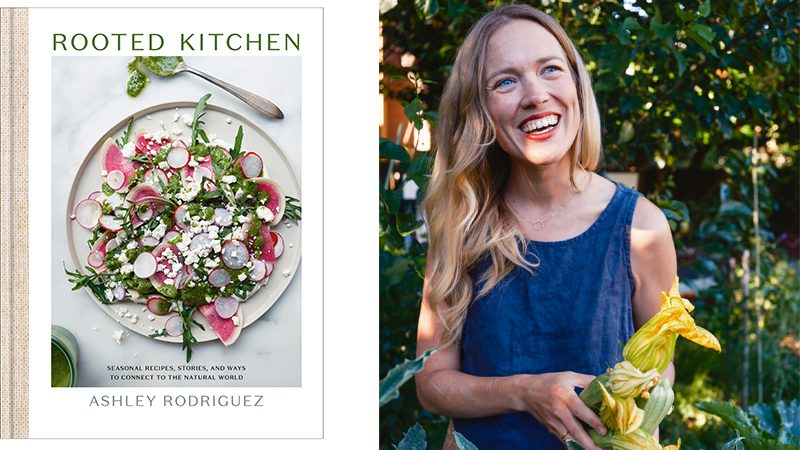Earth-to-table cooking with Ashley Rodriguez
By Rebekah Denn
This article was originally published in April 2024

Everything tastes better when you eat it outdoors. But the indoors meals gain a lot too, when they reflect the world around you. Ashley Rodriguez found both those truths when she began cooking over campfires, foraging and fishing — and paying more attention to the wild foods in her own neighborhood.
The pastry chef and cookbook author/photographer was working on an outdoors cooking show, “Kitchen Unnecessary,” when she started realizing “how good I felt when I was spending time outdoors,” she said.
That time led to still more time… and an earth-to-table way of cooking with the seasons. In her new cookbook, “Rooted Kitchen,” Rodriguez describes how a campfire stew, a basket of foraged mushrooms, or even tender young blossoms from a backyard tree can help rework our relationship with the Earth. In her expeditions, that works through dishes like clams in nettle cream sauce, green garlic and dandelion pancakes, and apricot tarte tartin. But it also means maple flowers from neighborhood trees, lilacs from her own yard, chocolate-blackberry cupcakes from the vines that run rampant around the city.
“In Seattle, we’re incredibly fortunate because we have so many natural spaces,” she said recently.
Rodriguez is a familiar face to a lot of locals. She grew up in Bellingham, roaming with siblings past cedar and fir and salal. Baking was her passion from childhood, and she eventually became a pastry chef at Spago in Los Angeles before returning to the Northwest. Her “Not Without Salt” blog and earlier two cookbooks established her as a voice in the region. Then that time spent in the mountains and trails made a fundamental change.
Studying to become a nature and forest therapy guide, she learned to observe and co-exist with the natural world, to see ingredients as friends who come and go with the seasons. “We relish their presence when they arrive and bid them adieu when their time has gone,” she wrote in the book.
Some of her recipes are simple and convenient — but convenience isn’t always her top priority. “I don’t always cook like this, but at times gathering your ingredients and cooking can be a form of meditation, or therapy.
“It can also obviously be frantic, and sometimes you just need to get dinner on the table. But by paying attention and slowing down, and coming at it from that place of gratitude, then it can change your perspective a bit.”
A peek into Rooted Kitchen
Peas and their Greens salad
This is a buildable salad. In many ways, this type of salad is my favorite because I can stack layers of flavorful ingredients in such a way that no two bites are exactly the same, but each excites and invites another bite.
My friends who have had this salad at the various events and occasions I’ve brought it to insisted that I include the recipe in my next book. It’s a celebration of peas in various forms, brought together with fragrant herbs, salty pecorino cheese, floral olive oil, and tart lemon juice. There is really not much more to it than that, yet it tastes as if there’s something secret hiding within the list of ingredients.
10 ounces fresh or frozen peas (about 2 cups), blanched
8 ounces sugar snap peas, thinly sliced (about 2 cups)
2 cups tender pea vines (see Note)
½ cup fresh mint leaves
¼ cup coarsely chopped
fresh dill
1½ ounces pecorino cheese, finely grated (about ½ cup )
⅓ cup pistachios, salted and roasted
Grated zest and juice of 1 small lemon
2 tablespoons extra-virgin olive oil
Flaky sea salt
On a large platter, layer half of these ingredients: the peas, snap peas, pea vines, mint, dill, pecorino, and pistachios. Sprinkle with half of the lemon zest and drizzle with half of the lemon juice and oil. Repeat, finishing the salad with a pinch or two of sea salt.
Kitchen Note: I’ve started planting extra pea seeds in the garden in early spring just for the vines. I have noticed that more and more grocery stores are now stocking the produce section with vines in the spring. But if you can’t find them or don’t have the space to grow them (although they do extremely well in a sunny windowsill), you can substitute arugula or butter lettuce for the greens.
Reprinted with permission from Rooted Kitchen: Seasonal Recipes, Stories, and Ways to Connect to the Natural World by Ashley Rodriguez.

